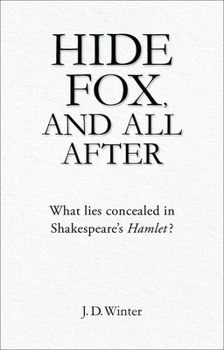Hide Fox, and All After: What Lies Concealed in Shakespeare's Hamlet?
Is there anything more to say on Hamlet? 'Hide fox, and all after, ' a casual quip of the Prince, as he and his enemy the King start to hunt each other down, is taken as the title for this closely-considered survey of the play. J D Winter finds question after question in it raised and unanswered, as if the play's dramatic method were in part to create uncertainty in its audience and so draw them in. He adopts three phrases from the text to provide a context for his approach: the play's the thing, a rhapsody of words, and the invisible event. The first phrase suggests the spectacle itself, without regard to what has been written about it. There is no reference to outside opinion nor is another literary work named. The second indicates an awareness of the text as poem. While the tremendous sweep of Shakespearean blank verse, the prose-paragraphs on fire with their own poetry, the whispering gallery of metaphor, can scarcely be accorded proper respect in a prose commentary, certain rhapsodic effects are everywhere noted. Finally, the play is contained within a mystery. So much seems to happen; so little seems to happen. Almost all the major characters are subject to a pattern of error in their dealings as they are swept on from one catastrophic misjudgement to another. The level to which the play is focussed upon the blind time between events is unusually high. This too draws in the audience; it is a part of the spectators own internal experience. There can be no definitive answer to Hamlet or Hamlet. But like a signpost in a swarming mist, the third phrase may offer a faint clue: the invisible event.
Format:Paperback
Language:English
ISBN:1845198875
ISBN13:9781845198879
Release Date:August 2017
Publisher:Liverpool University Press
Length:200 Pages
Weight:0.70 lbs.
Dimensions:0.6" x 5.5" x 8.4"
Customer Reviews
0 rating





